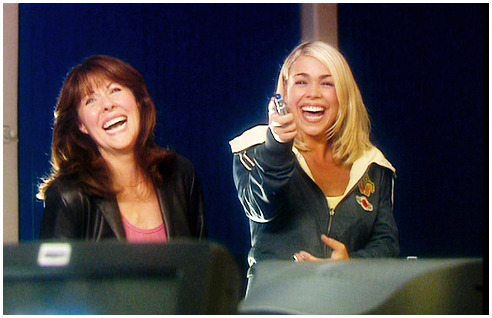
“Does he still stroke bits of the TARDIS?”
“Yea! I’m like, do you two want to be alone?”
Neil Gaiman is a fantastic, prolific writer. Together, we haven’t read as much of him as we should (neither of us have read the Sandman graphic novels. We’re working on it). But that didn’t stop us from being ridiculously excited when we heard he was writing an episode of Who. Perhaps one of Gaiman’s greatest strengths as a writer is that he cannot be pinned down into one genre as critics like to do. And writing this episode was another brilliant example of this. Yet though he may not have a genre, he definitely has a style. And though I can’t define it in words, this episode had Gaiman written all over it.
Needless to say, he did not disappoint. In one episode, he took an idea that had been circulating in the backwaters of the fandom since the very beginning and make it canon. Not only did he make it canon, he made it brilliant, funny, inspiring, and heartbreaking canon. The Doctor’s Wife was certainly the best episode so far this season. The concept of the TARDIS as the thing that the Doctor has and always will love best, through all his companions, is awesome. But to take that concept and pull it off, while making it seem real, requires genius. And Neil Gaiman has it.
Moffat is in many ways a really good writer. But I don’t think that he could have pulled this off. So hurrah to him for hiring Gaiman and giving him free rein. Because Gaiman did many wonderful things, several of which I had been wishing Moffat would do, but hasn’t as of yet.
Mostly, he has maintained continuity with the RTD era. Now, I know that Doctor Who is a divisive show, and writers have come and gone, and different incarnations of the Doctor are very different. But it seemed to me in the Eleventh Hour, and throughout the rest of series 5, that Moffat was working as hard as he could to disassociate himself with trademarks of the past five years. New TARDIS, new screwdriver, new logo, new music, new Daleks. Not that I’m against any of the changes - except the rainbow Daleks, what is up with them - but he seemed to be doing it for the wrong reasons. There were deeper departures, too. The Time Lords, whose loss was such an important part of the personalities of both Nine and Ten, were hardly mentioned. Yes, Eleven is a different guy, but still the same Time Lord, and it should still affect him.
 So I was delighted to see Gaiman bring up the Time Lords here. And he didn’t need to make for them An Epic Return of Doom, either. Eleven’s excitement that there might be more of his people left outside the universe, and his subsequent disappointment when he finds the mass of distress signals, is incredibly tragic, yet tragic on a quiet, simple level that makes it all the more potent. “You gave me hope and then took it away. That’s enough to make anyone dangerous. God knows what it will do to me.”
So I was delighted to see Gaiman bring up the Time Lords here. And he didn’t need to make for them An Epic Return of Doom, either. Eleven’s excitement that there might be more of his people left outside the universe, and his subsequent disappointment when he finds the mass of distress signals, is incredibly tragic, yet tragic on a quiet, simple level that makes it all the more potent. “You gave me hope and then took it away. That’s enough to make anyone dangerous. God knows what it will do to me.” To put the Doctor on a level of such quiet despair, and then send him to richocheting to almost unimaginable elation was such a daring move, but it paid off so well. “She’s a woman, and she’s my TARDIS.” “Did you wish really, really hard?” Suranne Jones, though dressed a bit too much like Bellatrix for my taste, was absolutely brilliant as TARDIS/Idris. Matt Smith, usually great on the banter, was on fire with her. It was fantastic to see the Doctor with an equal, with a love, not always the smartest, wisest person in the room.
Because really, the Doctor does not have an equal. It’s a theme that RTD did a lot with, which Moffat hasn’t really explored yet - the idea that the Doctor will outlive all his companions, and so can only enjoy their company for the blink of an eye. As a friend of mine pointed out, because of who he is, the Doctor simply “cannot sustain a functional relationship, which is tragic.” This episode touched on that aspect of the Doctor’s character that Moffat had ignored so far, which was wonderful, while bringing a new light, a new hope into such a sad fact. And although Idris could not remain human, could not talk forever, she will always be there. Wherever he goes, the Doctor will always have his TARDIS.
“You didn’t always take me where I wanted to go.”
“No, but I always took you where you needed to go.”

No comments:
Post a Comment